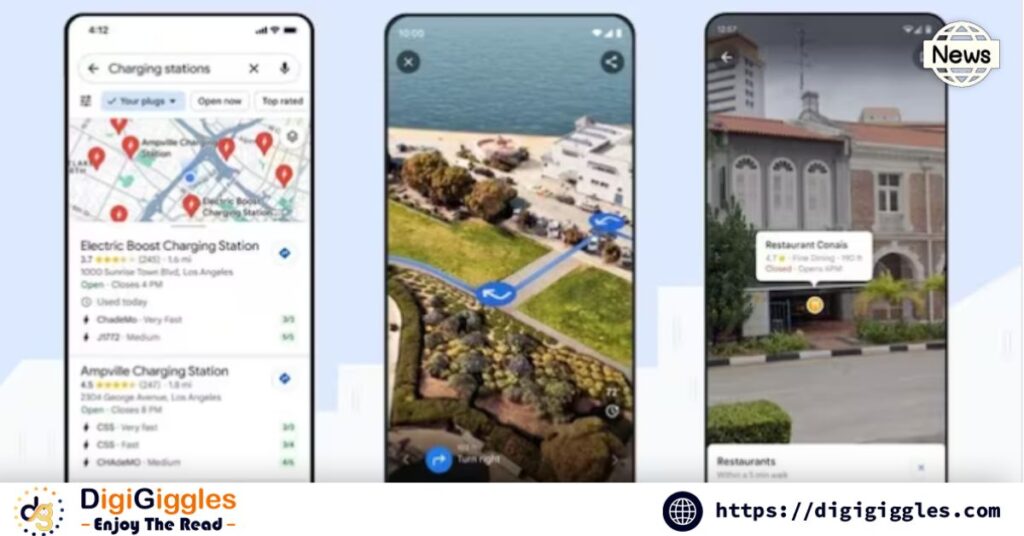
In the AI space, Google is presently facing fierce competition from Apple, Microsoft, Meta, and other companies. To maintain its advantage over competitors, the California-based behemoth has been busy introducing new features and products over the last few months, including its AI-powered search feature, Search Generative Experience (SGE), AI chatbot Bard, and more. Google Maps is the newest service to receive AI abilities as Google goods undergo an AI makeover.
Google announced in an official blog post that it is beginning to roll out Immersive View for routes in a few cities along with a number of AI features, like more straightforward driving directions, Google Lens in Maps, and the availability of EV charging stations, to help users confidently plan and navigate trips, make sustainable travel decisions, and quickly find inspiration for things to do.
Google Immersive view in Maps
Immersive View for Routes was initially revealed by Google during this year’s I/O conference. On both Android and iOS, the feature is currently being gradually rolled out to a number of places, including Amsterdam, Barcelona, Dublin, Florence, Las Vegas, London, Los Angeles, Miami, New York, Paris, San Francisco, San Jose, Seattle, Tokyo, and Venice.
With the help of this technology, users can view a 3D model of a place before going there. It creates a digital representation of the Earth by combining billions of aerial and Street View photographs using artificial intelligence (AI) and computer vision.
You can use Immersive View for routes once the feature is enabled in your city by opening Google Maps and navigating to a location in a supported city. A tiny “Immersive View” button will show up in the lower right corner of the map as you navigate around it. Press this button to launch Immersive View, which allows you to twist, zoom, and pan your phone to see the next path in three dimensions.
Lens in Maps
Google is introducing its AI-powered Search Lens function into Maps. AI and augmented reality are used by Google Lens in Maps to assist users in understanding their environment and locating nearby locations.
Over 50 cities worldwide presently have Lens in Maps available, and Google intends to add more in the upcoming months. Open the Google Maps app, then tap the Lens icon in the search box to utilize Lens in Maps. Next, lift your phone and aim it at the region that piques your curiosity. Lens will superimpose on the screen of your phone details about neighboring ATMs, train stations, eateries, coffee shops, and retail establishments.
More detailed map Google Maps
In order to improve the realism and accuracy of the navigation map, Google Maps is also providing more comprehensive maps to Maps. The update will bring with it new colors, more lifelike structures, enhanced highway lane details, information on HOV lanes in the US, and speed limit data generated by AI in Europe.
The addition of new colors will facilitate the differentiation of various components, including flora, water, and roadways. In the upcoming months, the capability will be accessible on Google Built-in vehicles, iOS, and Android devices. Twelve nations, including the United States, Canada, France, and Germany, will carry it.
EV information
Google is adding an EV information function to Mpas in an effort to ease EV drivers’ concerns about locating charging outlets. Drivers will be able to see through the new EV information feature whether a charger is fast, medium, or slow, as well as when it was last used, if it is compatible with their car. This data will be accessible on Android and iOS devices as well as in vehicles equipped with Google.
Developers will also have access to the EV information feature via the Google Maps Platform Places API. This implies that businesses can include information about EV charging stations in real-time into their own websites and applications.
Search in Google Maps
Lastly, the statement mentions how Google Maps would now incorporate Search. With the use of AI and image recognition algorithms, Google Maps now offers a visual search function that returns photo-based results for particular searches. Users will be presented with a list of photographs from locations that match their search phrases, such as “pumpkin patch with my dog” or “animal latte art,” which they may then explore further.
With intentions to expand, this new Maps search function is presently accessible in France, Germany, Japan, the United Kingdom, and the United States. In the upcoming weeks, this feature will be available on iOS and Android throughout the world.